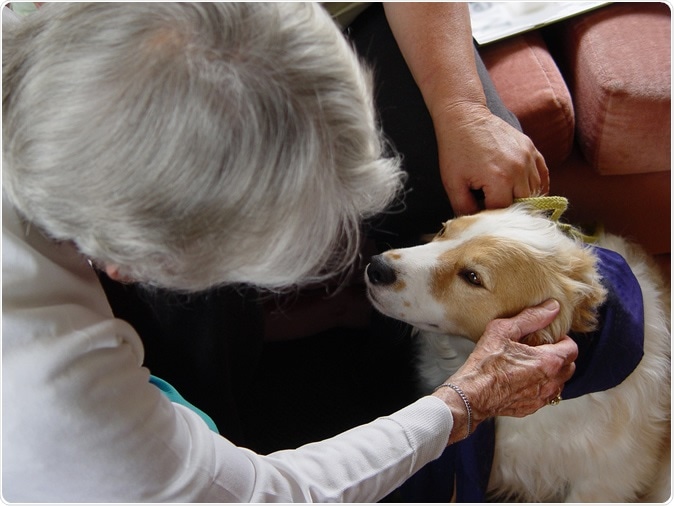There are more than a few anecdotal references of the usefulness of pet therapy for several disease conditions. In a new review of literature, Molly Crossman, a Yale University doctoral candidate, looked at all the scientific evidence there was on pets used in therapy for psychological stress. Her article “Effects of Interactions with Animals on Human Psychological Distress” is published in the Journal of Clinical Psychology. Her findings suggest that the benefits provided are short term and in some there was no effect of the pets or even higher stress levels when provided with pet therapy. In her work, Crossman termed pet therapy as Human–animal interaction (HAI).

Pet therapy. Image Credit: Sue McDonald / Shutterstock
The overall benefits according to her were “small to medium”. James Serpell, director of the Center for the Interaction of Animals and Society at the University of Pennsylvania School of Veterinary Medicine explained that the practice of therapy pets is based more on anecdotal beliefs and best practice of physicians who have noted improvements in mental health after involving animals in the daily routine or after adopting animals. Research is only now catching up to what was felt earlier, he said.
Use of pet animals for improvement of mental health has been around since the 17th Century where a Quaker-run retreat in England would include company of animals for the mentally ill patients. Sigmund Freud too involved his canine friends in the psychoanalysis sessions. Research in earnest in this field began in 1960s when American child psychologist Boris Levinson wrote about the positive influence of his dog Jingles on his patients.
However much remained to be understood says Crossman. Most of the earlier studies had a very small number of participants and there was no baseline or control group in most studies she writes. In a good research trial, the effects or benefit from a procedure is often compared with a group that is not provided with the intervention (in this case the pet therapy) to check for difference. Further all pets are generalized with no distinction among the type of animal used.
Hal Herzog, a Western Carolina University psychologist added that the studies tend to glorify the effects without scientific basis. Human-Animal Bond Research Initiative (HABRI) also piucks and chooses the best results from the studies to promote pets. While having pets may not be a bad thing, scientifically justifying is not correct say experts. Crossman reiterates that she is an animal lover.
Royal College of Nursing for example believes the anecdotal benefits of pet therapy and in a recent survey of 750 nursing staff, 82 per cent said these pets can help patients stay more active. Around 60% believed having pets improved recovery. However due to health and safety concerns, several work places these animals were banned.